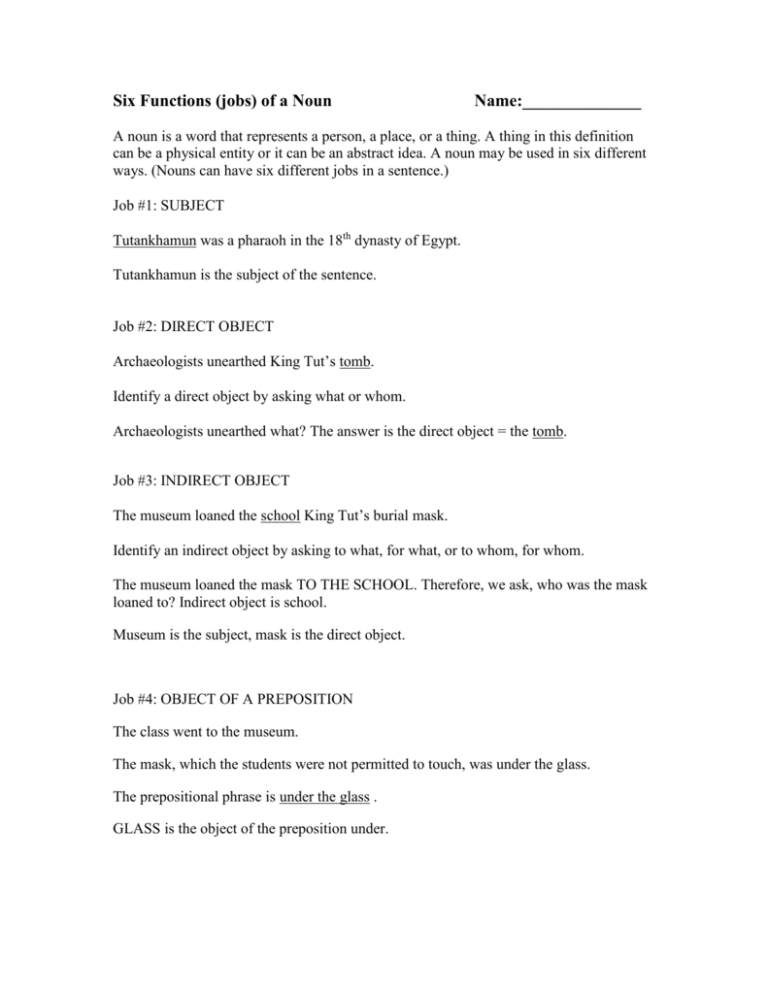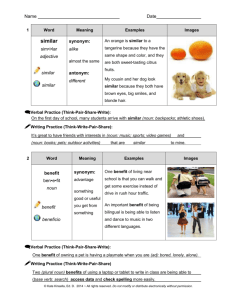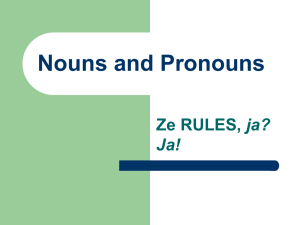Six Functions Noun
advertisement

Six Functions (jobs) of a Noun Name:______________ A noun is a word that represents a person, a place, or a thing. A thing in this definition can be a physical entity or it can be an abstract idea. A noun may be used in six different ways. (Nouns can have six different jobs in a sentence.) Job #1: SUBJECT Tutankhamun was a pharaoh in the 18th dynasty of Egypt. Tutankhamun is the subject of the sentence. Job #2: DIRECT OBJECT Archaeologists unearthed King Tut’s tomb. Identify a direct object by asking what or whom. Archaeologists unearthed what? The answer is the direct object = the tomb. Job #3: INDIRECT OBJECT The museum loaned the school King Tut’s burial mask. Identify an indirect object by asking to what, for what, or to whom, for whom. The museum loaned the mask TO THE SCHOOL. Therefore, we ask, who was the mask loaned to? Indirect object is school. Museum is the subject, mask is the direct object. Job #4: OBJECT OF A PREPOSITION The class went to the museum. The mask, which the students were not permitted to touch, was under the glass. The prepositional phrase is under the glass . GLASS is the object of the preposition under. Job #5 APPOSITIVE The word appositive is derived from Latin: ad ("near") and positio ("placement"). In English grammar an appositive is a noun or pronoun placed near another noun or pronoun. The appositive enhances our understanding of the original noun or pronoun. The Egyptian pharoah, Rameses I, was the founder of the 19th dynasty. Rameses I is the appositive. Job #6 PREDICATE NOUN/also called PREDICATE NOMINATIVE Sentences do not always contain action verbs. When a non-action verb, also called intransitive verb, is used, the noun that follows an intransitive verb and completes the meaning of a sentence is called a complement. (The word complement means to complete.) A sentence has a subject and a predicate. Predicate is a generic term that includes those parts of the sentence that explain the subject of the sentence. The noun that follows an intransitive verb and completes the predicate may also be called a predicate noun or predicate nominative. Note that a predicate noun is an alternate word for the object of the sentence. Cleopatra was the last pharaoh of Egypt. Cleopatra is the subject. Egypt is the object of the preposition. Pharoah is the predicate noun/nominative. (Nouns can also modify other nouns – Bring the water bucket over here. In this case, the noun is functioning as a adjective.) DID YOU KNOW? In generations past the first six or eight years of public education were conducted in schools that were frequently called "grammar schools." Students were often rigorously instructed in English grammar. A student might have been asked to parse a sentence. Parse means to take apart and describe as a noun could be described using the information given above. The term parse is currently enjoying popularity among computer programmers.









